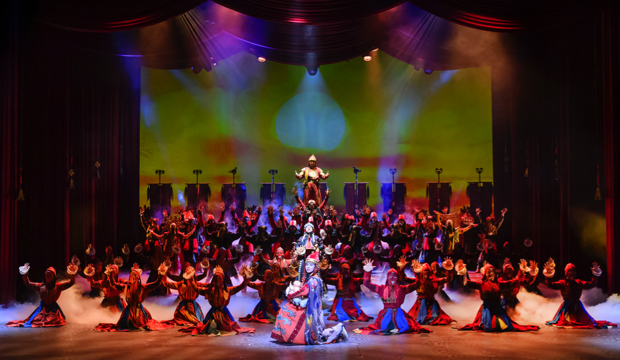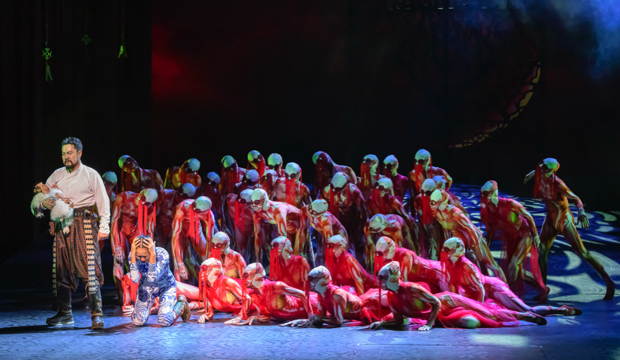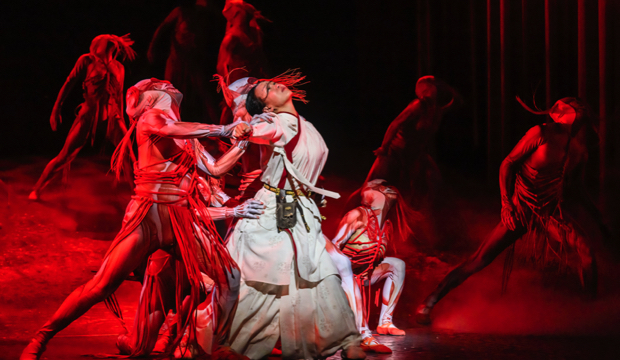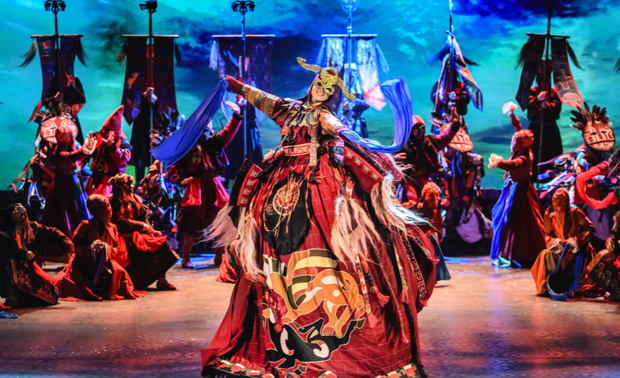The Mongol Khan review ★★★★★
The Mongol Khan brings a slice of Mongolian history and legend to the London Coliseum in a colourful, thoroughly theatrical spectacle
The Mongol Khan. Erdenebileg Ganbold as Archug Khan. Photo: Katja Ogrin
As epics go, you don’t get more spectacular than The Mongol Khan with its cast of more than 70 actors, dancers and puppeteers, dazzling costumes, atmospheric sets and an original score that drives and punctuates the action.

The Mongol Khan. Photo: Katja Ogrin
The story it tells, based on a play by the renowned Mongolian writer and poet Lkhagvasuren Bavuu, goes back to the ancient nomadic realm of Mongolia, at a time when it spanned vast territories in Inner Asia and eastern Europe. Although it is fictional and not a slice of actual history, it highlights issues crucial to Mongolian culture.
At its heart is a dilemma familiar to Shakespearean heroes: the clash between personal feeling and duty to the state.
Archug Khan’s two wives, the Queen (Uranchimeg Urtnasan) and the Consort (Dulguun Odkhuu), give birth within days of each other. The Queen’s son should be the rightful heir, but Archug Khan, played with tremendous power by the veteran actor Erdenebileg Ganbold, suspects he’s not the father.
And he’s right: the real father is his treacherous Chancellor, played by Bold-Erdene Sugar as a true villain (shades of Iago here). He’s determined that his son will be made heir, and faced with the Khan’s inclination to choose the Consort’s son, the Chancellor brutally forces the Queen to switch the babies.

The Mongol Khan. Photo: Katja Ogrin
Archug Khan names the Consort’s son (in really the Chancellor’s) as heir to his empire.
This fateful decision leads to a rollercoaster of bloody events, with the Khan struggling with ever more heartbreaking decisions, including the loss of his true love, the Consort.

The Mongol Khan. Photo: Katja Ogrin
Eventually, the right decision is made, much blood shed, the treacherous Chancellor disposed of in a visceral sword fight, and order is established. The Khan has done his duty and put the realm before personal feeling.
The show intersperses poetic text, spoken in Mongolian with English surtitles, with traditional dancing containing quite a few balletic elements, and ritualised movement, which is often cleverly used to enhance and enlarge the central action, or to comment on it like a Greek chorus.
The result is that the stage is constantly alive: the costumes, inspired by historic apparel but allowing for the designers' flights of imagination, are superbly detailed and colourful.

The Mongol Khan. Photo: Katja Ogrin
Blood-red predominates in costumes, sets and lighting, symbolising, perhaps, the importance of blood in lineage and also the bloody sequence of events resulting from the Khan’s original decision.
Symbols from Mongolian culture are used: a shaman’s vast feathered wings allude to the steppe eagle; and there is a glorious full-size fire-breathing dragon, pointing to Mongolia’s affinity with Chinese culture. Two 'flame-coloured' foxes, which in Mongolian tradition look after newborns, open and close the show.
The Mongol Khan is an intense show, where nuance is eschewed in favour of pointed acting, with the protagonists often addressing the audience. Within this, though, the acting is convincing and particularly affecting in the case of the two Queens, and in the moving interaction between the Khan and the Consort.
It’s the first time a Mongolian play has been presented to a European audience, adding some fascinating insights to our knowledge of Mongolia, which in my case I freely admit didn’t stretch much beyond Genghis Khan; the promoters hope it’ll go some way towards drawing visitors to a country now developing its tourist potential.
Age Guidance: 6+

The Mongol Khan. Photo: Katja Ogrin
The story it tells, based on a play by the renowned Mongolian writer and poet Lkhagvasuren Bavuu, goes back to the ancient nomadic realm of Mongolia, at a time when it spanned vast territories in Inner Asia and eastern Europe. Although it is fictional and not a slice of actual history, it highlights issues crucial to Mongolian culture.
At its heart is a dilemma familiar to Shakespearean heroes: the clash between personal feeling and duty to the state.
Archug Khan’s two wives, the Queen (Uranchimeg Urtnasan) and the Consort (Dulguun Odkhuu), give birth within days of each other. The Queen’s son should be the rightful heir, but Archug Khan, played with tremendous power by the veteran actor Erdenebileg Ganbold, suspects he’s not the father.
And he’s right: the real father is his treacherous Chancellor, played by Bold-Erdene Sugar as a true villain (shades of Iago here). He’s determined that his son will be made heir, and faced with the Khan’s inclination to choose the Consort’s son, the Chancellor brutally forces the Queen to switch the babies.

The Mongol Khan. Photo: Katja Ogrin
Archug Khan names the Consort’s son (in really the Chancellor’s) as heir to his empire.
This fateful decision leads to a rollercoaster of bloody events, with the Khan struggling with ever more heartbreaking decisions, including the loss of his true love, the Consort.

The Mongol Khan. Photo: Katja Ogrin
Eventually, the right decision is made, much blood shed, the treacherous Chancellor disposed of in a visceral sword fight, and order is established. The Khan has done his duty and put the realm before personal feeling.
The show intersperses poetic text, spoken in Mongolian with English surtitles, with traditional dancing containing quite a few balletic elements, and ritualised movement, which is often cleverly used to enhance and enlarge the central action, or to comment on it like a Greek chorus.
The result is that the stage is constantly alive: the costumes, inspired by historic apparel but allowing for the designers' flights of imagination, are superbly detailed and colourful.

The Mongol Khan. Photo: Katja Ogrin
Blood-red predominates in costumes, sets and lighting, symbolising, perhaps, the importance of blood in lineage and also the bloody sequence of events resulting from the Khan’s original decision.
Symbols from Mongolian culture are used: a shaman’s vast feathered wings allude to the steppe eagle; and there is a glorious full-size fire-breathing dragon, pointing to Mongolia’s affinity with Chinese culture. Two 'flame-coloured' foxes, which in Mongolian tradition look after newborns, open and close the show.
The Mongol Khan is an intense show, where nuance is eschewed in favour of pointed acting, with the protagonists often addressing the audience. Within this, though, the acting is convincing and particularly affecting in the case of the two Queens, and in the moving interaction between the Khan and the Consort.
It’s the first time a Mongolian play has been presented to a European audience, adding some fascinating insights to our knowledge of Mongolia, which in my case I freely admit didn’t stretch much beyond Genghis Khan; the promoters hope it’ll go some way towards drawing visitors to a country now developing its tourist potential.
Age Guidance: 6+
TRY CULTURE WHISPER
Receive free tickets & insider tips to unlock the best of London — direct to your inbox
| What | The Mongol Khan review |
| Where | London Coliseum, St Martin's Lane, , London , WC2N 4ES | MAP |
| Nearest tube | Charing Cross (underground) |
| When |
11 Nov 23 – 02 Dec 23, 19:00 Mats on 25, 16 Nov & 2 Dec at 14:00 Dur.: 3 hours |
| Price | £15-£110 (first preview all seats £30) |
| Website | Click here to book |